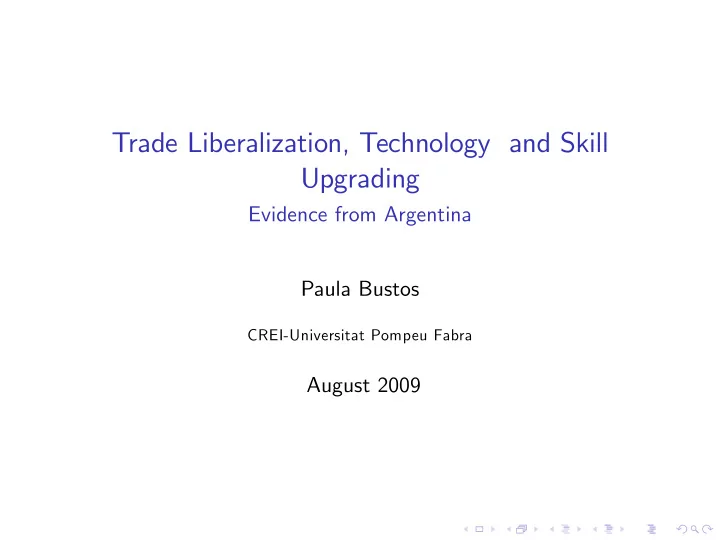

Trade Liberalization, Technology and Skill Upgrading Evidence from Argentina Paula Bustos CREI-Universitat Pompeu Fabra August 2009
Introduction I During the last 25 years the skill premium has increased in several countries I Coincidence of rising skill premium and relative employment of skilled workers I Outwards shift in the relative demand for skill I Most research focused on two possible causes: I Trade or skilled biased technical change I An open question remains on the e¤ects of trade on technology adoption and its indirect e¤ects on skill upgrading through that channel
Empirical Evidence: H-O Trade vs. Technology I Empirical evidence is hard to reconcile with H-O trade theory: I The skill premium increased both in developed and developing countries I The increase in the relative demand for skill is not driven by reallocation of labor towards skill intensive industries I Instead, skill intensity increased within most industries [Berman Bound and Griliches (1994), Goldberg and Pavcnik (2004)] I All these …ndings are consistent with the adoption of skill-biased technologies in all countries and industries I In addition, both in the U.S and OECD countries, industries with faster adoption of IT had faster increase in skill intensity [Autor Katz and Krueger (1998), Machin and Van Reenen (1998)]
Trade Induced Technical Change? I Several theoretical papers have noted that if technology adoption is endogenous the empirical …ndings cited above can be reconciled with trade being the ultimate cause of the increase in the relative demand for skill, through its e¤ects on technology adoption. I Trade can a¤ect the skill-bias of R&D: [Acemoglu (2002), Thoening and Verdier (2005)] I Expanded export opportunities can induce …rms to adopt new technologies [Yeaple(2005)] I In Bustos (2005, 2007) I build on Yeaple (2005) and Melitz (2003) and present model where I Bilateral trade liberalization reallocates market shares towards the most productive …rms inducing them to adopt skill-biased new technologies I I test the model in the context of a regional trade liberalization episode, MERCOSUR
Model: Melitz (2003) + Technology Choice I Fixed exporting costs: I only the most productive …rms enter export markets I Fixed technology adoption costs: I only the most productive …rms (exporters) adopt new technologies I Reduction in variable trade costs: I more …rms enter the export market I more …rms adopt new technology I heterogeneity is crucial for this result: if all …rms export variable trade costs have no impact on technology adoption
Test of Model’s predictions: Context and Data I Context: MERCOSUR I Brazil’s Tari¤s for Argentinean products fall from an average of 29% in 1991 to zero in 1995. I Exports to Brazil quadruple while exports to the rest of the world increase only 60% I The college wage premium increased 7 p.p. per year in the industrial sector (Galeani and Sanguinetti, 2003) I Data: I Survey of Innovation and Technological Behavior of Argentinean Firms, panel of 1380 …rms for 1992-1996. I Findings on Skill Upgrading 1992-1996 I The employment of college/highschool+primary school increased 17% I Most of the increase ocurred within industries, moreover within …rms I Skill upgrading both within production labor and within non-production labor
Test of Model’s predictions: Causality? I Exporters vs. non Exporters I New entrants in the export market and countinuing exporters upgrade technology and skill faster than non exporters in the same industry. I E¤ect of the reduction in Brazil’s tari¤s: I I …nd that …rms in industries with bigger reductions in Brazil’s tari¤s are more likely to I enter the export market I upgrade technology I increase skill intensity I The e¤ects of tari¤ reductions are strongest in the upper-middle range of the …rm size distribution.
How much skill upgrading can MERCOSUR explain? I The employment share of college graduates on …rms above median size was 18.5% in 1992 (in prim. school equiv) I It increased on average 2 pp. in the period 1992-1996 I The coe…cient estimates imply that the average reduction in Brazil’s tari¤s (24 pp) increased skill intensity by 1 p.p in …rms above median size. I Thus, it can explain 50% of skill upgrading within big …rms.
Related Literature I I Empirics: I U.S.- OECD: Lawrence and Slaughter (1993); Berman Bound and Griliches (1994); Autor Katz and Krueger (1998), Machin and Van Reenen (1998) I Latin America: Pavcnik et al (2004); Verhoogen (2008) I Theory: I Acemoglu (1998, 2003), Yeaple (2005), Thoening and Verdier (2005)
Related Literature II I Only the most productive …rms export and trade liberalization reallocates market shares towards the most productive …rms I Empirics: Clerides, Llach and Tybout (1998); Bernard and Jensen (1999); Aw, Chung and Roberts (2000), Pavcnik (2002) I Theory: Melitz (2003); Bernard, Eaton, Jensen and Kortum (2003) I Trade liberalization can have a positive impact on …rm productivity I Unilateral trade liberalization: Pavcnik (2002) I Reduction in trading partner’s tari¤s: Tre‡er (2004) I Trade liberalization can induce …rms to adopt new technologies, export channel: I Theory: Yeaple (2005), Bustos(2007) I Empirics: Bustos(2007), Lileeva and Tre‡er (2007) I Dynamic models of innovation and export decisions: I Atkenson and Burstein (2007), Melitz and Constantini (2007), Aw, Roberts and Xu (2009)
Recommend
More recommend